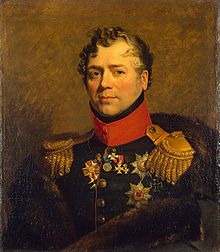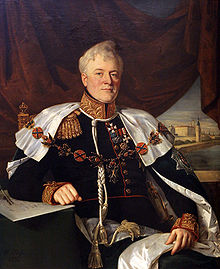- Dmitry Golitsyn
-
 Portrait by George Dawe from the Military Gallery
Portrait by George Dawe from the Military Gallery
Serene Prince Dmitriy Vladimirovich Golitsyn (Russian: Дмитрий Владимирович Голицын) (29 October 1771 – 27 March 1844, Paris) was a Russian cavalry general prominent during the Napoleonic Wars, statesman and military writer.
He was born in the family of Knyaz Vladimir Borisovich Golitsyn (1731 – 1798) and his wife Natalie Tchernyshova, nicknamed La Princesse Moustache, or the Queen of Spades, who was portrayed as a central character in Pushkin's story (and Tchaikovsky's opera) of the same name.
In 1774 Golitsyn was enrolled in the Leib Guard Preobrazhensky regiment and received his first rank of sergeant in 1777. He continued his education in Strasbourg and from 1781 he travelled in Germany and France with his family. In the middle of 1780s the Golitsyns settled in Paris, where Dmitriy studied military science. In 1785 Golitsyn returned to Russia and entered the cavalry. During the Kościuszko Uprising he fought under Aleksandr Suvorov and on 24 October 1794 distinguished himself at the Battle of Praga and earned his first Order of St. George of the 4th degree.
In the reign of Emperor Paul I he was quickly promoted, first to colonel (on 2 May 1797), then to Major General (on 5 August 1798), and finally to Lieutenant General (on 21 August 1800). He meanwhile received the Order of St. Anna, 4th degree, and became a member of the Knights Hospitaller.
Golitsyn fought bravely during the Napoleonic Wars. In 1805, during the War of the Third Coalition, his regiment started the campaign in the corps of Count Bennigsen in Silesia. In December 1806 he led the 4th division at the Battle of Golymin. This victory and success of Bennigsen at the Battle of Pułtusk stopped the French forces. After that, Golitsyn commanded the cavalry of the left wing. His forces took part in all major actions – at Eylau, Heilsberg and Friedland. For this campaign he received numerous Russian and foreign awards: the Order of St. George, 3rd degree (on 21 January 1807), the Order of St. Vladimir, 2nd degree, the Prussian Order of the Red Eagle (on 18 May 1807), the Order of the Black Eagle on 25 June 1807), and a gold sword with diamonds with the inscription For Bravery.
After a brief participation in the Finnish War Golitsyn resigned his commission on 18 April 1809 and travelled in Germany. He listened to lectures at different universities. Upon returning to Russia he lived on his estate near Moscow.
On 31 August 1812 he entered military service again. Kutuzov entrusted him with leading the cavalry of the 2nd army, at which he excelled at Borodino, Vyasma, and Krasny. In 1814 he was promoted to the rank of full General-of-Cavalry. He governed Moscow as War Governor for 25 years. In 1829 he founded a committee aimed at the protection of prisoners and supported Friedrich Joseph Haass.
On 16 April 1841 Golitsyn received the title of Serene Prince for his great merits.
From the end of 1830s Golitsyn was seriously ill and from 1838 he received medical treatment for the urolithiasis. He died in Paris on 27 March 1844, several months before the 25-years anniversary of his service as Governor of Moscow.
Works
Dmitriy Golitsyn wrote several military books, including:
- Essai sur le 4-eme livre de Vegece (1790)
- Manuel du volontaire en campagne (1794)
- Опыт наставлений, касающийся до экзерсиций и манёвров кавалерийского полка (1804)
He also sponsored the Bulletin du Nord described Russia for foreign readers.
Preceded by
Alexander TormasovWar Governor of Moscow Governorate
1820 – 1843Succeeded by
Aleksei TscherbatovReferences
- Template:Rsubst:BD
- Dictionary of Russian Generals
- Families of the nobility of the Russian Empire. Vol. II "Princes". St.Petersburg, 1995. P. 42.
- This article includes content derived from the Russian Biographical Dictionary, 1896–1918.
Categories:- 1771 births
- 1844 deaths
- Galitzine family
- Imperial Russian Army generals
- Mayors of Moscow
- Members of the State Council of the Russian Empire
- Recipients of the Order of the Black Eagle
- Recipients of the Order of the Red Eagle
- Recipients of the Order of Saint George III Class
- Recipients of the Order of Saint George IV Class
- Russian commanders of the Napoleonic Wars
- Russian military writers
Wikimedia Foundation. 2010.

